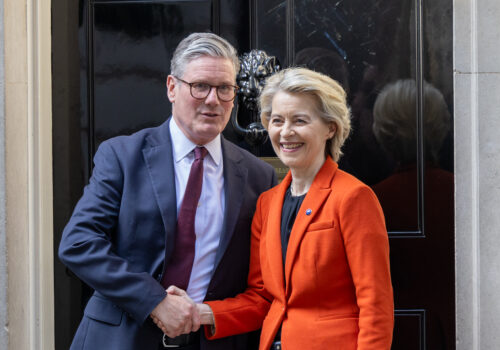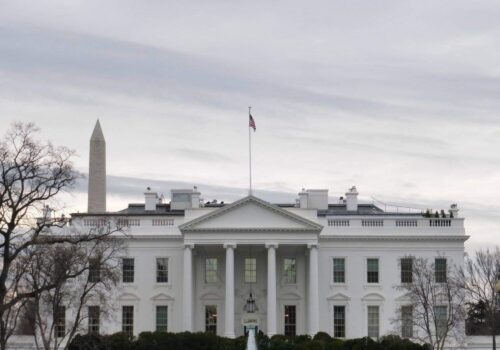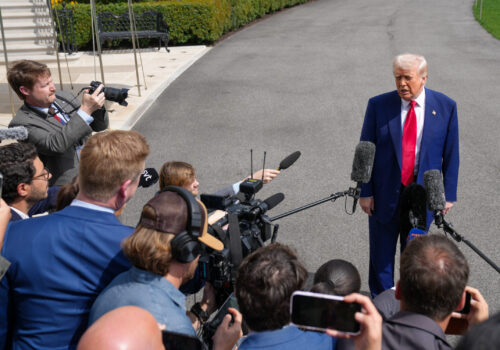Dispatch from London: Engaging Trump without alienating the rest
Perhaps not incidentally, the Atlantic Council GeoEconomics Center’s trip to London last week coincided with major geoeconomic events for the United Kingdom and the world. The Center’s team traveled across the pond for a series of meetings and events to determine if the recent US-UK trade deal could be a template for other countries seeking accords with the United States.
After the Trump administration’s sweeping “liberation day tariffs,” the British government thought that taking the lead on negotiating with the United States might be risky. It feared other countries might blame the United Kingdom for enabling the United States’ 10 percent tariff, which is now assumed to be an unavoidable baseline, even for countries that US President Donald Trump likes. But there’s a palpable sense of relief that, so far, no other country seems to have blamed the United Kingdom for doing the deal.
British officials told us they had known it would be difficult to secure a broader tariff exemption for the United Kingdom, concurring with the GeoEconomics Center’s view that the Trump administration remains more serious about tariffs than the markets have considered. The separate exemptions for the United Kingdom from Section 232 tariffs on autos and steel (within certain quotas) are seen as significant achievements. Concessions made by the United Kingdom on imports of beef and ethanol have encountered only limited political backlash, so far.
Despite UK officials’ subtle understanding of the US administration, our interlocutors were still surprised when we warned them that the reciprocal tariffs announced on “liberation day” could be reimposed on other markets if bilateral negotiations fail to meet the US president’s expectations. This realization made them feel even better about securing a deal, and they underscored the serious misunderstanding that exists even in allied governments about the administration’s true trade goals.
The deal’s four short paragraphs on economic security show that the UK government has picked up on US concerns regarding avoiding tariffs through transshipments. An agreement was reached to refrain from further conversations on transshipments and risky vendors, though officials were keen to remind us that the deal does not constrain London’s reset with China. One of the authors (Charles Lichfield) was able to make this point on Wednesday when he gave oral evidence to the International Relations and Defence Committee of the House of Lords in a session on the future of the United Kingdom’s relations with the United States.
The sequencing of the Labour government’s trade deals was designed with domestic politics in mind. It is no coincidence that the US deal, as well as the recent trade deal with India, came before the UK-European Union Summit and its announcement of a renewed agenda for cooperation. Labour can now credibly say that it is achieving the global trade deals that the Conservative Party promised—and failed to deliver—after Brexit.
There are political risks to every deal. UK Prime Minister Keir Starmer’s government has been criticized for allowing firms to bring Indian tech workers to the United Kingdom without complying with British labor laws. Still, prioritizing the US and India deals has apparently protected the government from the inevitable accusations of “Brexit betrayal.” The attempt to reset relations with the European Union is also broadly popular. Disproportionate attention is paid to the fishing industry, which represents 0.02 percent of the gross value added by the British economy. The British beef industry, which will now face more competition from the United States, received much less attention.
The Labour government’s achievements haven’t prevented a sharp decline in the polls, fueled by mediocre growth (barely 1 percent this year) and a fraught migration debate. Without any remarkable improvement in public finances, Chancellor of the Exchequer Rachel Reeves has been forced to switch her priorities from reining in spending (and blaming this on the previous Conservative government) to prioritizing growth.
Last week, the prime minister partially walked back one of Reeves’s flagship policies of “means testing,” which is an entitlement that aims to help pensioners pay their winter heating bills by proposing that the cut-off threshold would be raised to a currently undisclosed level. Doing so makes the government vulnerable to its own parliamentary caucus, which will demand more concessions on social spending to deliver a sense of economic uplift faster.
The Trump administration is placing demands on its oldest allies, which it isn’t on newer friends in the Gulf. In a speech at Chatham House, one of the authors (Josh Lipsky) highlighted that the economic security dimension of the US-UK deal is what could underpin the future of a Group of Seven alliance to counter China economically. But our counterparts in the United Kingdom raised two key concerns. First, they asked whether the United States still saw value in alliances to achieve economic goals, or if the US priority was to reset global trade irrespective of alliances. Second, they remarked that there is no guarantee that policies decided by this US administration would continue in the years to come.
The same questions were raised at Bank of England, where senior officials questioned the Trump administration’s policies on stablecoins and cryptocurrency. Their own assessment was that unleashing these assets globally without the right regulatory framework could potentially destabilize other countries’ financial systems.
Overall, the unifying theme was a desire for stability but a begrudging acceptance that, at least from the United States, none was coming in the near term. As it approaches its first year in office, the Labour government is navigating these choppy international waters with some success. Alongside the trade deals, it has also kept the Trump administration engaged in Ukraine. These achievements all serve domestic prosperity in the United Kingdom—but making sure voters feel they are benefiting from these will be very challenging.
Josh Lipsky is chair of international economics at the Atlantic Council and senior director of the Atlantic Council’s GeoEconomics Center.
Charles Lichfield is the deputy director and C. Boyden Gray senior fellow of the Atlantic Council’s GeoEconomics Center.

At the intersection of economics, finance, and foreign policy, the GeoEconomics Center is a translation hub with the goal of helping shape a better global economic future.
Further reading
Thu, May 15, 2025
Can the EU-UK summit lead to a new post-Brexit partnership?
New Atlanticist By Ed Owen
With shared challenges at home and abroad, the United Kingdom and European Union have an opportunity to renew their trade and security ties.
Fri, May 16, 2025
The next 120 days of predictably volatile trade policy
Econographics By Barbara C. Matthews
The understandable relief associated with de-escalating the tariff war will soon fade as we enter a long, uncertain summer of tariff pauses and major negotiations. Take a look at some convenings that might be important.
Tue, May 27, 2025
What’s the Trump administration’s dollar strategy? It depends on who you ask.
New Atlanticist By Alisha Chhangani
Within the White House, there appear to be competing and fractured views of the dollar’s role. This dissonance could result in harm to the currency’s long-term dominance.
Image: City View of London around Liverpool Street station


